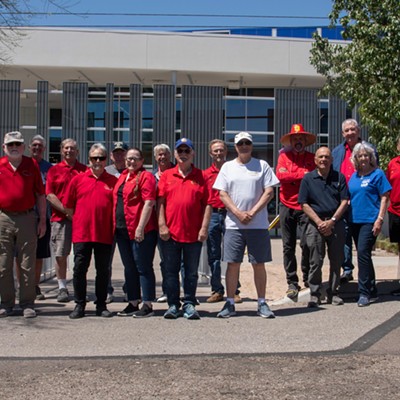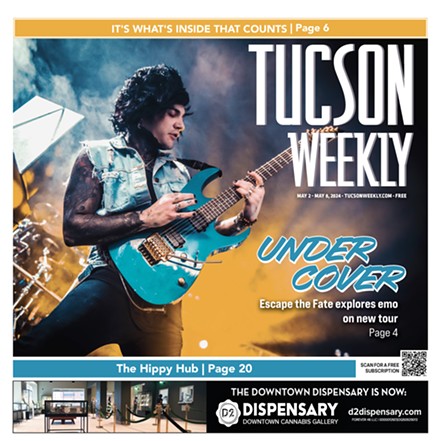A 20-year-old Syrian refugee told his story to demonstrators holding signs that read "Refugees Welcome" and "No Muslim Ban," at a rally in El Presidio Park, on Saturday morning last week.
Like many new arrivals, he's anxious about policies and rhetoric that negatively affect refugees and asked that his name not be published.
His story is not uncommon. His family of five fled Syria's civil war to Jordan. Once there, they could barely make enough money to get by. And although he wanted to go to school, at 16, he had to start working full-time.
The family was granted refugee status and arrived in the U.S. six months ago—all of them except his sister. She got married while in Jordan and so was not allowed to relocate with her family. They still hope she and her husband will be able to join them soon in the U.S.
The We the People Grassroots Community Rally was one of the many local actions in response to President Donald Trump's executive order that temporarily bars travelers from seven Muslim-majority countries and all refugees. The order bars Syrian refugees indefinitely and would cut the number of all refugees to be admitted this year from 110,000 to 50,000.
A Seattle federal judge, James Robart, appointed by President George W. Bush, temporarily reversed the ban on Feb. 4. The following day, the Ninth Circuit Court of Appeals denied a request from the Justice Department to restore the executive order. The block on the ban remained in place as of the Weekly's press deadline.
The State Department directed the International Organization for Migration, which handles refugee travel to the U.S., to start booking flights on the morning of Feb. 6, according to Amy Fairchild Haer, associate director for the Migration and Refugee Services of Catholic Community Services–Tucson.
CCS is expecting a refugee woman, whose original flight had been canceled due to the order, and a refugee family this week.
Still unclear on the Trump administration's next action, many refugees here and abroad are still uncertain of their futures.
City Council Member Steve Kozachik told the protestors at the rally that they were affirming the values on which the U.S. was founded.
"We do not slam the door in the face of refugees," he said. "I have a message for the bat-shit crazy narcissist who is sitting in the Oval Office right now, barking out executive orders that would overturn the moral foundation on which we are framed: It will not stand."
Another concern for refugees and their allies is a bill in the Arizona legislature which, if passed by lawmakers and signed by Gov. Doug Ducey, would force charities and refugee-resettlement organizations to cease refugee resettlement activities. SB 1468 would fine organizations that do not comply $1,000 a day per refugee.
Refugees currently receive 90 days of resettlement services, and they were still arriving hours before the ban went into effect, Fairchild Haer said.
Oula Gaber, long-time volunteer at Noor Women's Association, a nonprofit founded by Muslim women that's been helping refugees from all countries and faiths since 1995, said the nonprofit would continue to help refugees regardless of whether SB 1468 passes.
"They will continue doing it because, in the end, they want to help humanity" she said. "They want to help the people. It doesn't have anything to do with politics."
The charity started because women wanted to help people in need, said Lynn Hourani, another one of the group's volunteers.
"Even if the organization stops, the women will never stop," she said.
Local Catholic Diocese Bishop Gerald Kicanas and Rabbi Thomas Louchheim also spoke at the rally and condemned the president's ban.
Kicanas and 75 other religious leaders signed a statement asking Trump and Arizona senators and representatives to denounce the ban on refugees and the border wall.
"We are a community that believes in the importance of welcoming the stranger," he said. "Around the world, there are people struggling today to survive. They need our help. They need us to open our doors. Yes, we have to do proper vetting. Yes, we have to be diligent. But we cannot let fear run our lives."
Foreigners who are from the seven countries in the travel ban have not killed any U.S. citizen in a terrorist attack on U.S. soil from 1975 through 2015, according to the Cato Institute.
Gatherings such as the El Presidio Park rally, considerably smaller than the estimated 700 to 800 that protested in front of the Federal Building on Jan. 30, are becoming a common occurrence under the new administration. But this may be another issue on which the country is almost evenly divided.
A recent poll of 1,002 adult Americans, done by CNN and ORC International, found that 53 percent opposed the ban and 47 percent were for it. But the study had a margin of error of plus or minus 3 percentage points.
And while many are calling Trump's action a Muslim ban, his administration says its a pause on letting people in from countries that have been compromised by terrorism until they can establish an extreme-vetting process.
Refugees already go through an extensive vetting process, including biographic and biometric security screenings, medical screenings, forensic testing of their identifying documents and in-person interviews, Fairchild Haer of CCS said at Our Savior's Lutheran Church on the morning of Feb. 3.
The results of the screenings are then checked against the law enforcement and intelligent databases of the National Counterterrorism Center, Department of Defense, FBI, Department of State and Department of Homeland Security.
"If there is any doubt about who a refugee is, that refugee does not come to the United States," Fairchild Haer said. "The U.S. Refugee Resettlement Program saves the lives of refugees while at the same time ensuring the safety of America."
As Fairchild Haer and other community leaders spoke in opposition to the ban, a small group of refugees stood to the side, waiting to tell their story.
Osam Yahya, age 22, stood out. A head taller than everyone else, with lanky arms hanging at his sides, he was soft-spoken and solemn as he spoke to the crowd.
After 10 years of enduring violence and poverty in a Kenyan refugee camp, he made it the U.S., less than two months ago. He came alone. His brother was set to arrive on Feb. 7. Now Yahya doesn't know when or if he'll see his brother again.
His voice caught as he told the crowd of around 40 that he was with his family in the refugee camp. They were all told they were going to the United States, but now he's alone. Nonetheless, he's grateful for the support
"I'm thankful to the United States of America," he said. "Thank you for standing with refugees. I'm glad to be here."









